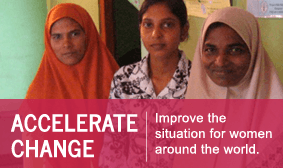Women, Corruption and the Open Government Partnership

Women’s Campaign International: Accelerating Change
The Open Government Partnership (OGP) offers communities around the world an opportunity to make government more accountable, and help citizens combat corruption, regardless of their gender. Even in countries where women and men enjoy “equality” in the public sphere, they are often affected by corruption in surprisingly different ways. Funds directed toward women, are more likely to be pilfered by state agents since women are often less aware of their rights, and less willing than men to hold government to account. In addition, sexual services are sometimes demanded instead of money bribes. The sexual exploitation of women and girls in exchange for a copy of a birth certificate, a job or a teacher’s exploitation of a female student in return for tuition, amounts to the abuse of public office for private gain. [1]
By educating and supporting women’s rights advocates to participate in all OGP processes, we can help reduce corruption while simultaneously addressing genderOGP participating governments are bringing gender perspectives to popular policy areas, ensuring diversity in participatory processes, and specifically targeting gender gaps in policies to address gov... More discrimination by governments. While the participation of civil society has been built into the OGP from the outset, the ability of women’s NGOs to contribute to OGP processes has been limited. In some cases, the lack of participation by women’s NGOs can be attributed to a poor understanding of the benefits of open government for women, or the methods by which women can hold governments more accountable. In addition, a lack of access to ICTs – through which governments are increasingly sharing information with citizens – is also an issue. In other cases, CSOs with strong expertise in open government and counter-corruption may not operate in similar circles as women’s NGOs, so may lack connections with them. Possible OGP programmatic initiatives that will help to ensure that women benefit from OGP efforts, include the following:
- When donors provide funding for governments to combat corruption, similar attention and resources should be provided to civil society organizations and particularly women’s organizations to promote a flow of information between government and citizens that is clear, understandable, and relevant to citizens’ daily lives.
- Create networks between counter-corruption NGOs and women’s organizations.
- Promote access to information and OGP principles through public-private dialogue and include women’s organizations.
- Train citizens to utilize government information via traditional media and community-based outreach and engagement efforts.
- Improve women’s access to existing and new technology to more effectively hold government to account.
- Develop complaint mechanisms which allow citizens to report incidents of corruption when dealings with government, and engage community members in the process of monitoring government responsiveness to those complaints.
